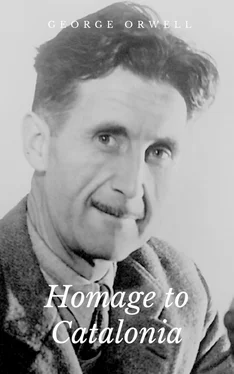'Yo sé manejar fusil. No sé manejar ametralladora. Quiero aprender ametralladora. Quándo vamos aprender ametralladora?'
The answer was always a harassed smile and a promise that there should be machine-gun instruction mañana. Needless to say mañana never came. Several days passed and the recruits learned to march in step and spring to attention almost smartly, but if they knew which end of a rifle the bullet came out of, that was all they knew. One day an armed Carabinero strolled up to us when we were halting and allowed us to examine his rifle. It turned out that in the whole of my section no one except myself even knew how to load the rifle, much less how to take aim.
All this time I was having the usual struggles with the Spanish language. Apart from myself there was only one Englishman at the barracks, and nobody even among the officers spoke a word of French. Things were not made easier for me by the fact that when my companions spoke to one another they generally spoke in Catalan. The only way I could get along was to carry everywhere a small dictionary which I whipped out of my pocket in moments of crisis. But I would sooner be a foreigner in Spain than in most countries. How easy it is to make friends in Spain! Within a day or two there was a score of militiamen who called me by my Christian name, showed me the ropes and overwhelmed me with hospitality. I am not writing a book of propaganda and I do not want to idealise the POUM militia. The whole militia-system had serious faults, and the men themselves were a mixed lot, for by this time voluntary recruitment was falling off and many of the best men were already at the front or dead. There was always among us a certain percentage who were completely useless. Boys of fifteen were being brought up for enlistment by their parents, quite openly for the sake of the ten pesetas a day which was the militiaman's wage; also for the sake of the bread which the militia received in plenty and could smuggle home to their parents. But I defy anyone to be thrown as I was among the Spanish working class—I ought perhaps to say the Catalan working class, for apart from a few Aragonese and Andalusians I mixed only with Catalans—and not be struck by their essential decency; above all, their straightforwardness and generosity. A Spaniard's generosity, in the ordinary sense of the word, is at times almost embarrassing. If you ask him for a cigarette he will force the whole packet upon you. And beyond this there is generosity in a deeper sense, a real largeness of spirit, which I have met with again and again in the most unpromising circumstances. Some of the journalists and other foreigners who travelled in Spain during the war have declared that in secret the Spaniards were bitterly jealous of foreign aid. All I can say is that I never observed anything of the kind. I remember that a few days before I left the barracks a group of men returned on leave from the front. They were talking excitedly about their experiences and were full of enthusiasm for some French troops who had been next to them at Huesca. The French were very brave, they said; adding enthusiastically: 'Más valientes que nosotros'—'Braver than we are!' Of course I demurred, whereupon they explained that the French knew more of the art of war—were more expert with bombs, machine-guns, and so forth. Yet the remark was significant. An Englishman would cut his hand off sooner than say a thing like that.
Every foreigner who served in the militia spent his first few weeks in learning to love the Spaniards and in being exasperated by certain of their characteristics. In the front line my own exasperation sometimes reached the pitch of fury. The Spaniards are good at many things, but not at making war. All foreigners alike are appalled by their inefficiency, above all their maddening unpunctuality. The one Spanish word that no foreigner can avoid learning is mañana—'tomorrow' (literally, 'the morning'). Whenever it is conceivably possible, the business of today is put off until mañana. This is so notorious that even the Spaniards themselves make jokes about it. In Spain nothing, from a meal to a battle, ever happens at the appointed time. As a general rule things happen too late, but just occasionally—just so that you shan't even be able to depend on their happening late—they happen too early. A train which is due to leave at eight will normally leave at any time between nine and ten, but perhaps once a week, thanks to some private whim of the engine-driver, it leaves at half-past seven. Such things can be a little trying. In theory I rather admire the Spaniards for not sharing our Northern time-neurosis; but unfortunately I share it myself.
After endless rumours, mañanas, and delays we were suddenly ordered to the front at two hours' notice, when much of our equipment was still unissued. There were terrible tumults in the quartermaster's store; in the end numbers of men had to leave without their full equipment. The barracks had promptly filled with women who seemed to have sprung up from the ground and were helping their men-folk to roll their blankets and pack their kit-bags. It was rather humiliating that I had to be shown how to put on my new leather cartridge-boxes by a Spanish girl, the wife of Williams, the other English militiaman. She was a gentle, dark-eyed, intensely feminine creature who looked as though her life-work was to rock a cradle, but who as a matter of fact had fought bravely in the street-battles of July. At this time she was carrying a baby which was born just ten months after the outbreak of war and had perhaps been begotten behind a barricade.
The train was due to leave at eight, and it was about ten past eight when the harassed, sweating officers managed to marshal us in the barrack square. I remember very vividly the torchlit scene—the uproar and excitement, the red flags flapping in the torchlight, the massed ranks of militiamen with their knapsacks on their backs and their rolled blankets worn bandolier-wise across the shoulder; and the shouting and the clatter of boots and tin pannikins, and then a tremendous and finally successful hissing for silence; and then some political commissar standing beneath a huge rolling red banner and making us a speech in Catalan. Finally they marched us to the station, taking the longest route, three or four miles, so as to show us to the whole town. In the Ramblas they halted us while a borrowed band played some revolutionary tune or other. Once again the conquering-hero stuff—shouting and enthusiasm, red flags and red and black flags everywhere, friendly crowds thronging the pavement to have a look at us, women waving from the windows. How natural it all seemed then; how remote and improbable now! The train was packed so tight with men that there was barely room even on the floor, let alone on the seats. At the last moment Williams's wife came rushing down the platform and gave us a bottle of wine and a foot of that bright red sausage which tastes of soap and gives you diarrhoea. The train crawled out of Catalonia and on to the plateau of Aragón at the normal war-time speed of something under twenty kilometres an hour.
II
Barbastro, though a long way from the front line, looked bleak and chipped. Swarms of militiamen in shabby uniforms wandered up and down the streets, trying to keep warm. On a ruinous wall I came upon a poster dating from the previous year and announcing that 'six handsome bulls' would be killed in the arena on such and such a date. How forlorn its faded colours looked! Where were the handsome bulls and the handsome bullfighters now? It appeared that even in Barcelona there were hardly any bullfights nowadays; for some reason all the best matadors were Fascists.
They sent my company by lorry to Siétamo, then westward to Alcubierre, which was just behind the line fronting Saragossa. Siétamo had been fought over three times before the Anarchists finally took it in October, and parts of it were smashed to pieces by shell-fire and most of the houses pockmarked by rifle-bullets. We were 1,500 feet above sea-level now. It was beastly cold, with dense mists that came swirling up from nowhere. Between Siétamo and Alcubierre the lorry-driver lost his way (this was one of the regular features of the war) and we were wandering for hours in the mist. It was late at night when we reached Alcubierre. Somebody shepherded us through morasses of mud into a mule-stable where we dug ourselves down into the chaff and promptly fell asleep. Chaff is not bad to sleep in when it is clean, not so good as hay but better than straw. It was only in the morning light that I discovered that the chaff was full of breadcrusts, torn newspaper, bones, dead rats, and jagged milk tins.
Читать дальше











